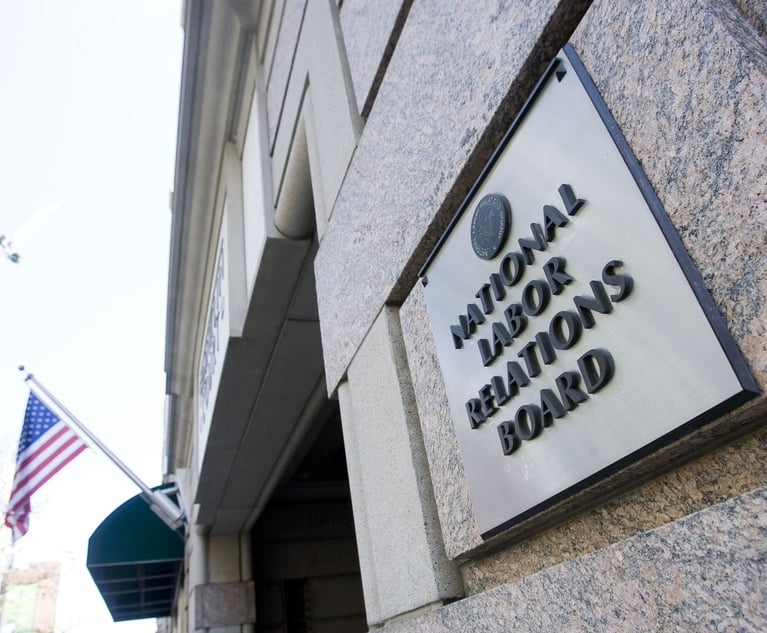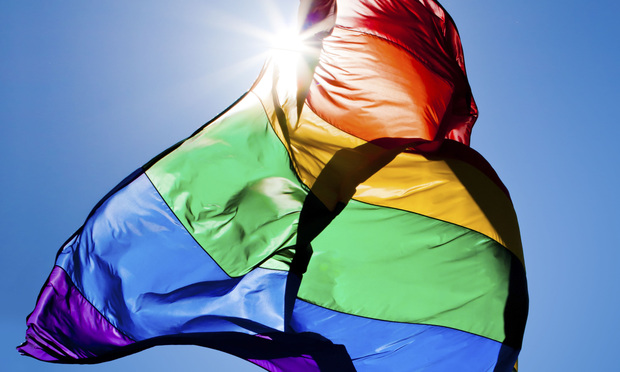Gov't Agencies Spar In Second Circuit Over LGBTQ Rights
Two government agencies faced off Tuesday afternoon before a federal appeals court over whether federal civil rights law, as written, includes protection…
September 26, 2017 at 08:44 PM
7 minute read
Two government agencies faced off Tuesday afternoon before a federal appeals court over whether federal civil rights law, as written, includes protection against discrimination based on sexual orientation.
Zarda v. Altitude Express was argued in front of the U.S. Court of Appeals for the Second Circuit in Manhattan, seated en banc –and made for some colorful exchanges between judges and attorneys representing the U.S. Department of Justice and the U.S. Equal Employment Opportunity Commission, respectively, which are pitted against each other in arguing this case.
Zarda is one of a string of recent cases that confronts the issue of whether or not the protection against discrimination “on the basis of sex” under Title VII of the Civil Rights Act of 1964 should be interpreted to include protection for sexual orientation. The issue may reach the U.S. Supreme Court in the near future.
The case centers on Don Zarda, who sued his employer, Altitude Express, claiming he was fired from his job as a skydiving instructor there because of his sexual orientation, in violation of federal and New York state law. Zarda has passed away since the initial filing of his case but it is being continued by his sister Melissa Zarda and his life partner Bill Moore.
A three-judge panel of the Second Circuit ruled in April that Title VII does not protect LGBTQ workers but the full appeals court agreed to revisit that decision. This followed a landmark decision in the U.S. Court of Appeals for the Seventh Circuit, which was the first circuit court to rule that Title VII covers sexual orientation earlier in April.
The EEOC has strongly favored including sexual orientation under the umbrella of Title VII in recent years, and its views have been essential in framing arguments in favor of inclusion.
When asked at the Second Circuit Tuesday how the agency adopted its current position on the issue, Jeremy Horowitz, who appeared for the EEOC, told the panel that the agency recently took a “fresh look” at the issue by considering guidance from the U.S. Supreme Court and meeting with both employers and employees.
Judge Rosemary Pooler asked if the EEOC also solicited input from the DOJ in its decision-making, to which Horowitz said he was “not aware” if it did.
“It's a little bit awkward for us to have the federal government on both sides of the case,” Pooler said.
“Indeed, your honor,” Horowitz replied, which drew laughs from spectators.
In July, the Justice Department under the Trump administration filed an amicus brief in the Zarda case, veering from the EEOC's position.
Former Jones Day attorney Hashim Mooppan, appearing for the Justice Department, argued that most circuit courts have “expressly rejected” the argument that Title VII offers protection on the basis of sexual orientation and that Congress has repeatedly failed to pass bills to clarify the statute's language.
Justices repeatedly asked Mooppan about the legal process for the two government agencies, such as whether or not Main Justice would need to sign off on an amicus brief filed by the EEOC, but the attorney said it would not be “appropriate” for him to disclose the information.
Judges also needled Mooppan on the bounds of Title VII and the groups it protects.
During an exchange with Judge Gerard Lynch, who asked if it is “sort of OK” to discriminate on the basis of gender, Mooppan said that employers are allowed to fire employees for out-of-work sexual behaviors, such as being promiscuous, and that there are “real, physical” differences between men and women.
“The critical difference, your honor, is that discrimination requires treating people who are similarly situated differently,” Mooppan said.
If and when the issue comes before the Supreme Court, the DOJ would represent the government.
In spite of the courts' uncertainty around the issue, the EEOC has filed at least six lawsuits alleging sexual orientation discrimination. Since 2013, when the EEOC began tracking such cases, there have been 5,088 LGBT discrimination charges filed with the agency. Of those, 3,985 of them, including 638 charges that resulted in some relief for the charging party, were resolved.
It is extremely rare for two government entities to face off in court. Both the EEOC and the DOJ are responsible for enforcing federal civil rights laws, but in different realms.
The case has been widely watched. Major companies and activist groups have weighed in and offered opinions through amicus briefs.
The interpretation of “sex” under Title VII has evolved throughout the decades, said Anthony Michael Kreis, professor at Chicago-Kent College of Law, who has written extensively about sexual orientation discrimination cases.
Early circuit courts in the 1970s and 1980s ruled to exclude sexual orientation as a protected class under civil rights law. Yet, sexual harassment, power inequities due to sex and cases of gender stereotyping provided different understandings of what it means to protect workers on the basis of sex, Kreis said.
“The issues the Zarda case brings up are significant. We can continue to draw the lines to how sex is protected,” Kreis said. “It's a jumbled mess.”
Federal appeals courts that have confronted the scope of LGBTQ protections in the workplace have reached different positions, setting the stage for the Supreme Court. Though the Seventh Circuit recently ruled in favor of including sexual orientation in the Title VII fold, in March, a three-judge panel for the Eleventh Circuit, took the opposite stance, echoing rulings from other circuits in the past.
The issue of gender identity and whether transgender workers are protected under Title VII has proven easier for courts to resolve. Four circuits have agreed that transgender workers are protected under the statute.
Lambda Legal has filed a cert petition to ask the U.S. Supreme Court to consider its Title VII sexual orientation case out of the Eleventh Circuit. In its argument, the advocacy group pointed to the split in the courts, as well as the diverging opinions of the government. .
Despite all the legal uncertainty, most Fortune 100 companies have adopted policies to protect workers of all sexual orientations, according to the Human Rights Campaign. State and local governments have also passed protections for sexual orientation in recent years.
Even with the sea change among companies of late, there are still pending cases in which LGBTQ people are challenging businesses' decisions to refuse them goods and services, so there is still an issue, said Susan Eisenberg, an attorney with Cozen O'Connor. She said no matter how the full court rules in Zarda, the case could still reach the Supreme Court, given the split in the Seventh and Eleventh Circuits.
Meanwhile, she's advising clients to “get on board” to amend policies and do training to take sexual orientation discrimination claims seriously.
“I think the momentum has been that judges and, even employers, want it covered,” Eisenberg said. “I think this behooves companies to get ahead of the curve on this issue.”
Contact Erin Mulvaney at [email protected]. Contact Andrew Denney at [email protected].
This content has been archived. It is available through our partners, LexisNexis® and Bloomberg Law.
To view this content, please continue to their sites.
Not a Lexis Subscriber?
Subscribe Now
Not a Bloomberg Law Subscriber?
Subscribe Now
NOT FOR REPRINT
© 2025 ALM Global, LLC, All Rights Reserved. Request academic re-use from www.copyright.com. All other uses, submit a request to [email protected]. For more information visit Asset & Logo Licensing.
You Might Like
View All
Trump Fires EEOC Commissioners, Kneecapping Democrat-Controlled Civil Rights Agency

Trump’s Firing of NLRB Member Could Spark Review of Supreme Court Precedent

Testing Legal Authority, Trump Fires NLRB Member, Leaving Panel Without Quorum
3 minute read
Trending Stories
- 1Uber Files RICO Suit Against Plaintiff-Side Firms Alleging Fraudulent Injury Claims
- 2The Law Firm Disrupted: Scrutinizing the Elephant More Than the Mouse
- 3Inherent Diminished Value Damages Unavailable to 3rd-Party Claimants, Court Says
- 4Pa. Defense Firm Sued by Client Over Ex-Eagles Player's $43.5M Med Mal Win
- 5Losses Mount at Morris Manning, but Departing Ex-Chair Stays Bullish About His Old Firm's Future
Who Got The Work
J. Brugh Lower of Gibbons has entered an appearance for industrial equipment supplier Devco Corporation in a pending trademark infringement lawsuit. The suit, accusing the defendant of selling knock-off Graco products, was filed Dec. 18 in New Jersey District Court by Rivkin Radler on behalf of Graco Inc. and Graco Minnesota. The case, assigned to U.S. District Judge Zahid N. Quraishi, is 3:24-cv-11294, Graco Inc. et al v. Devco Corporation.
Who Got The Work
Rebecca Maller-Stein and Kent A. Yalowitz of Arnold & Porter Kaye Scholer have entered their appearances for Hanaco Venture Capital and its executives, Lior Prosor and David Frankel, in a pending securities lawsuit. The action, filed on Dec. 24 in New York Southern District Court by Zell, Aron & Co. on behalf of Goldeneye Advisors, accuses the defendants of negligently and fraudulently managing the plaintiff's $1 million investment. The case, assigned to U.S. District Judge Vernon S. Broderick, is 1:24-cv-09918, Goldeneye Advisors, LLC v. Hanaco Venture Capital, Ltd. et al.
Who Got The Work
Attorneys from A&O Shearman has stepped in as defense counsel for Toronto-Dominion Bank and other defendants in a pending securities class action. The suit, filed Dec. 11 in New York Southern District Court by Bleichmar Fonti & Auld, accuses the defendants of concealing the bank's 'pervasive' deficiencies in regards to its compliance with the Bank Secrecy Act and the quality of its anti-money laundering controls. The case, assigned to U.S. District Judge Arun Subramanian, is 1:24-cv-09445, Gonzalez v. The Toronto-Dominion Bank et al.
Who Got The Work
Crown Castle International, a Pennsylvania company providing shared communications infrastructure, has turned to Luke D. Wolf of Gordon Rees Scully Mansukhani to fend off a pending breach-of-contract lawsuit. The court action, filed Nov. 25 in Michigan Eastern District Court by Hooper Hathaway PC on behalf of The Town Residences LLC, accuses Crown Castle of failing to transfer approximately $30,000 in utility payments from T-Mobile in breach of a roof-top lease and assignment agreement. The case, assigned to U.S. District Judge Susan K. Declercq, is 2:24-cv-13131, The Town Residences LLC v. T-Mobile US, Inc. et al.
Who Got The Work
Wilfred P. Coronato and Daniel M. Schwartz of McCarter & English have stepped in as defense counsel to Electrolux Home Products Inc. in a pending product liability lawsuit. The court action, filed Nov. 26 in New York Eastern District Court by Poulos Lopiccolo PC and Nagel Rice LLP on behalf of David Stern, alleges that the defendant's refrigerators’ drawers and shelving repeatedly break and fall apart within months after purchase. The case, assigned to U.S. District Judge Joan M. Azrack, is 2:24-cv-08204, Stern v. Electrolux Home Products, Inc.
Featured Firms
Law Offices of Gary Martin Hays & Associates, P.C.
(470) 294-1674
Law Offices of Mark E. Salomone
(857) 444-6468
Smith & Hassler
(713) 739-1250









